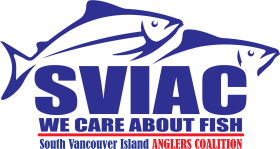This is how the DFO does business
For years, the DFO has cited a “lack of Chinook salmon” as the main reason for fishery closures aimed at aiding Southern Resident Killer Whale (SRKWs) recovery. Yet the agency has now made the executive decision to shut down the Sooke Sea Pen Project, undermining its very mission.
We have long served as a cornerstone in advancing that goal. At its core, SVIAC is a community-driven stewardship of the Juan de Fuca Strait and the surrounding waters of Southern British Columbia. Our projects are powered by volunteers, local partners, and a shared commitment to maintaining healthy, thriving waterways for anglers and the communities that depend on them. Together, we work to ensure these waters remain resilient, abundant, and full of opportunity for generations to come.
February 20th
During the Victoria SFAC (Sport Fishing Advisory Committee) meeting, SVIAC received a letter outlining the DFO’s “proposal” to discontinue our Sooke Sea Pen project, along with their rationale:
March 23rd
SVIAC responded to the then–Fisheries Minister Diane Lebouthillier, addressing the proposed termination of our Sooke Sea Pen project:
July 3rd
SVIAC received an email request from Pieter Van Will, Acting Section Head of the Salmonid Enhancement Program, to meet and discuss the future of the Sooke Sea Pen project:
July 22nd
SVIAC received an email from Susan Chambers, Executive Lead of the Pacific Salmon Strategy Initiative, in response to our letters to the Fisheries Minister:
August 12th
SVIAC met with DFO staff to discuss the future of the Sooke Sea Pen project. While the official meeting notes released by the DFO suggest the discussion was about SVIAC engaging in “alternative projects,” that is not an accurate reflection of what took place in the meeting.
This is what really happened
And why it matters so deeply.
The Sooke Sea Pen’s true purpose was ignored.
The Sooke Sea Pen Project, also called the Chinook Enhancement Initiative, began in 2016 to increase Chinook salmon in the Juan de Fuca Strait. It also supports Southern Resident Killer Whales (SRKWs) through SVIAC’s Orca Food Security Program (OFSP).
Despite this, the DFO evaluated the project only as a “production project,” ignoring its important role in SRKW conservation and its wider ecological benefits.
Community contributions were downplayed.
For years, the Sooke Sea Pen project has been sustained by local fundraising, volunteers, and support from the T’Sou-ke First Nation. The DFO’s communications wrongly portray government funding as the main driver of the project’s success.
This misrepresentation not only dismisses the hard work and commitment behind the project but also overlooks the tireless dedication of our community and the vital role of their efforts in keeping our waters thriving.
Flexibility was offered, but ignored.
SVIAC made clear we could accept fewer Chinook smolts in years when hatchery supply was constrained. This willingness never appeared in the DFO’s summary of the meeting.
The decision had already been made.
The DFO’s stated purpose for the meeting was straightforward: to engage with SVIAC regarding the “planned termination” of the project.
Despite our willingness to adapt and improve the program, the DFO made it clear that the project’s termination was already a “done deal.” Following this statement, the tone of the meeting shifted abruptly, leaving little room for genuine collaboration and prompting the DFO’s own representative to admit, “We should have developed an exit strategy.”
SVIAC remains committed to supporting salmon enhancement and SRKW recovery in the Salish Sea and beyond. But the way this decision was handled raises serious concerns about transparency, accountability, and the DFO’s willingness to work with community partners.

